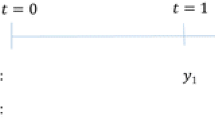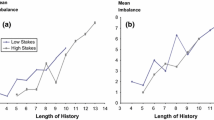Abstract
In this paper we propose a concept of coalitional fair allocation in order to solve the tension that may exist between efficiency and envy-freeness when agents are asymmetrically informed and the equity of allocations is evaluated at the interim stage.
Similar content being viewed by others
Notes
This assumption implies that the following correspondence has measurable graph: \(\Pi : T\rightarrow 2^\mathcal{F}\) defined by \(\Pi (t)=\Pi _ t\). It means that the set \(G_{\Pi }=\{(t, \mathcal{E}): \mathcal{E}\in \Pi _ t\}\) belongs to the product \(\sigma \)-algebras \(\mathcal{T}\otimes \mathcal{B}(2^\mathcal{F})\), where \(\mathcal{B}\) denotes the Borel \(\sigma \)-algebra.
See Graziano and Pesce (2012) for an analysis on coalitional fairness notion in differential information economies in which agents receive no signal at the time of contracting.
Differently from the perfect information notions, we will explicitly require Pareto efficiency due to the free disposal condition imposed on allocations.
It is just needed to put for all \(\omega \), the envious coalition \(S_1(\omega )\) equal to the whole set of agents \(T\) and the other coalition \(S_2(\omega )\) equal to the empty set.
Since the measure space of agents is assumed to be finite and complete, the measurability of the projection \(Proj_{T}S^*\) for each measurable subset \(S^ *\) of \(T^ *\) follows by the Projection Theorem (see Theorem 14.84 in Aliprantis and Border 2006).
References
Aliprantis CD, Border KC (2006) Infinite dimensional analysis, 3rd edn. Springer, Berlin
De Castro LI, Yannelis NC (2008) Ambiguity aversion solves the conflict between efficiency and incentive compatibility. University of Illinois at Urbana-Champaign (discussion paper)
De Castro LI, Pesce M, Yannelis NC (2011) Core and equilibria under ambiguity. Econ Theory 48:519–548
de Clippel G (2008) Equity, envy and efficiency under asymmetric information. Econ Lett 99:265–267
Foley D (1967) Resource allocation and the public sector. Yale Econ Essays 7:45–98
Gabszewicz JJ (1975) Coalitional fairness of allocations in pure exchange economies. Econometrica 3:661–668
Gajdos T, Tallon JM (2002) Fairness under uncertainty. Econ Bull 4:1–7
Graziano MG, Pesce M (2012) Coalitional fairness under asymmetric information. Mediterr J Math 7:575–603
Harsanyi JC (1967–1968) Games with incomplete information played by Bayesian players. Manage Sci 14:159–182, 320–334, 486–502
Schwalbe U (1999) The Core of an exchange economy with asymmetric information. J Econ 70:155–185
Svensson LG (1983) On the existence of fair allocations. J Econ 43:301–308
Varian H (1974) Equity, envy and efficiency. J Econ Theory 9:63–91
Vind K (1971) Lecture notes for economics. Stanford University, Spring 288
Wilson R (1978) Information, efficiency, and the core of an economy. Econometrica 46:807–816
Yannelis NC (1985) Value and fairness. In: Aliprantis CD, Burkinshaw O, Rothman NJ (eds) Advances in equilibrium theory. Springer, Berlin, pp 205–235
Yannelis NC (1991) The core of an economy with differential information. Econ Theory 1:183–198
Zhou L (1992) Strictly fair allocations in large exchange economies. J Econ Theory 57:158–175
Acknowledgments
We would like to thank A. Basile for valuable comments.
Author information
Authors and Affiliations
Corresponding author
Additional information
An earlier version of this paper circulated with the title “Fairness properties of constrained market equilibria” as CSEF working paper http://www.csef.it/WP/wp245.pdf.
Rights and permissions
About this article
Cite this article
Donnini, C., Graziano, M.G. & Pesce, M. Coalitional fairness in interim differential information economies. J Econ 111, 55–68 (2014). https://doi.org/10.1007/s00712-012-0322-4
Received:
Accepted:
Published:
Issue Date:
DOI: https://doi.org/10.1007/s00712-012-0322-4




